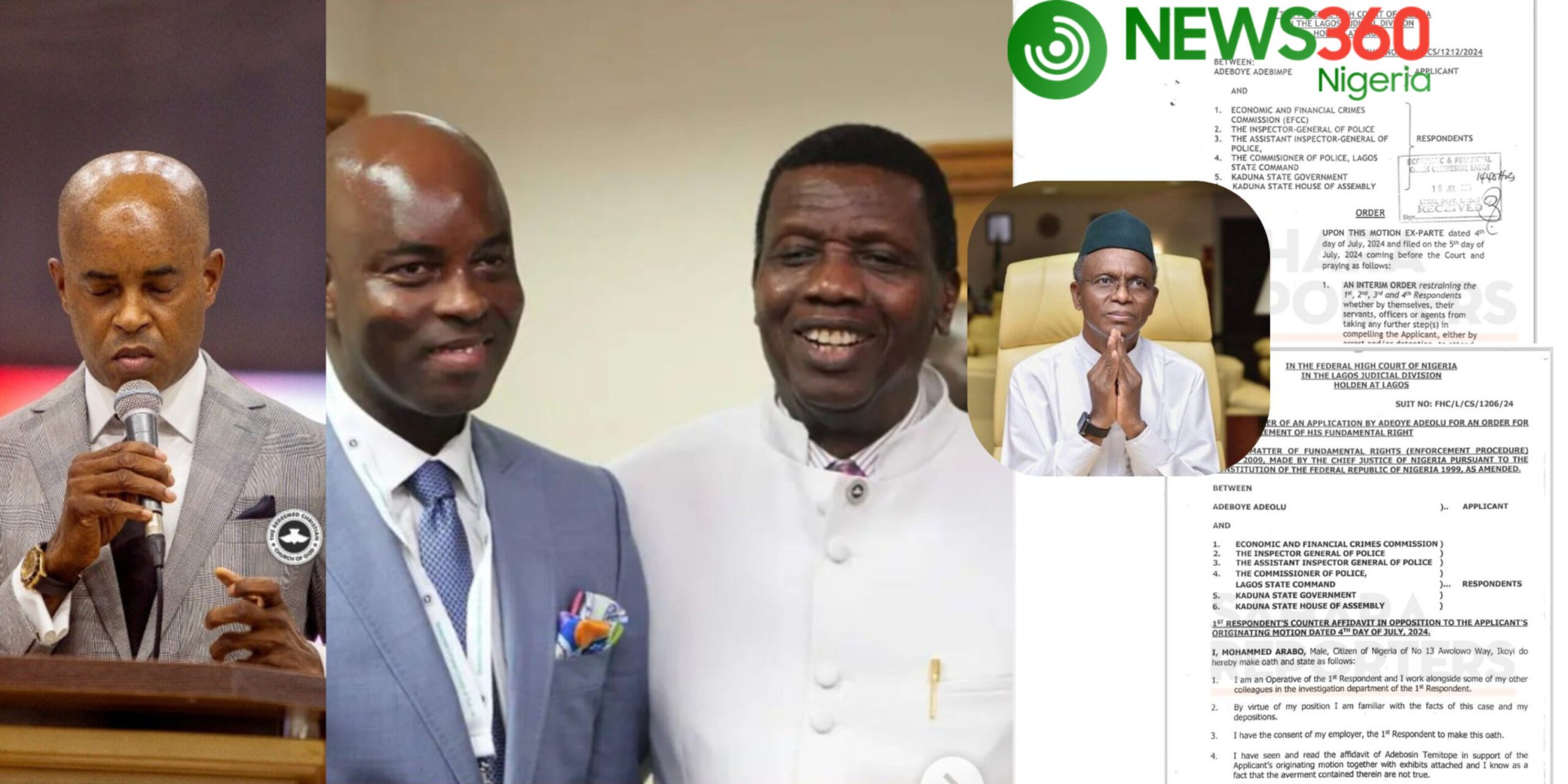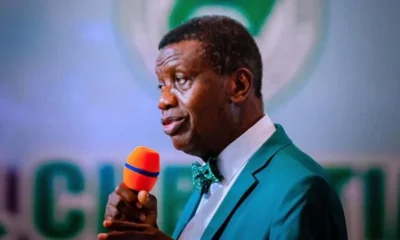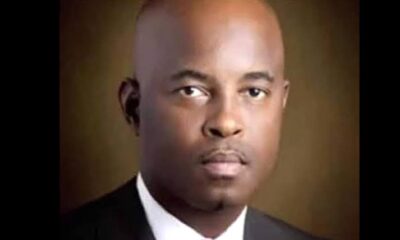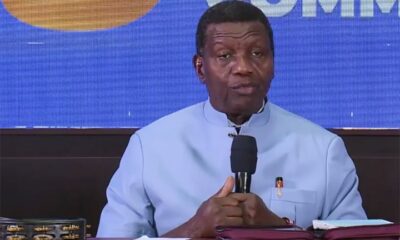Inside Nigeria
Pst. Adeboye’s son faces legal battle over abandoned N17.26B Kaduna project

Adeolu Adeboye, the son of Pastor Enoch Adeboye, General Overseer of the Redeemed Christian Church of God (RCCG), is embroiled in a legal controversy after allegedly abandoning a government contract in Kaduna State.
Adeolu and his wife secured the contract through their company, Ronchess Global Resources Plc, during the tenure of former Governor Nasir El-Rufai.
The project, valued at N17.26 billion, involved the construction of an 8km road from Wusasa to Danmagaji Nagoyi in Zaria.
Despite receiving over N8 billion for the project, reports indicate that only 30% of the work was completed before the site was abandoned.
This prompted the Kaduna State Government and the House of Assembly to launch an investigation into the alleged misappropriation of funds.
In response, Adeolu Adeboye filed a lawsuit (FHC/L/CS/1206/24) at the Federal High Court in Lagos, seeking to prevent the Economic and Financial Crimes Commission (EFCC), Kaduna State Government, and the House of Assembly from arresting or detaining him over the unfinished project.
The suit also names the Inspector General of Police, Assistant Inspector General of Police, and Commissioner of Police, Lagos State Command, as respondents.
On May 16, 2024, a Kaduna State House of Assembly team inspected the project site and confirmed that the work had been abandoned.
The contract, originally awarded on September 15, 2020, was expected to be completed by January 2, 2021, within an 18-month period. The initial contract sum of N8.74 billion was later revised to N17.26 billion on December 6, 2022.
However, to stop the probe, Adeolu Adeboye quickly ran to court to seek an “interim order restraining the 1st, 2nd, 3rd and 4th Respondents whether by themselves, their servants, officers or agents from taking any further step(s) in compelling the Applicant (him), either by arrest and/or detention, to attend the scheduled meetings of 8th July, 2024 or any other meeting or any meeting subsequently convened by the 1st-4th and 5th &6th Respondents in respect of the contracts awarded to Ronchess Global Resources Plc. which are presently subject of a pending civil action filed at the Kaduna State High Court…”
This is constituted as Suit No: KDH/KAD/594/2024: Ronchess Global Resources Plc v. Kaduna State Government, Kaduna State House of Assembly &2 ors.
He sought the interim order pending the hearing and final determination of the Applicant’s (Adeolu) Motion on Notice for Interlocutory Injunction filed herein.
Justice K.O. Ogundare of the Federal High Court in Lagos subsequently granted an interim order “to the Applicant (Adeolu) directing the parties herein, whether by themselves, their agents, officers, servants or otherwise howsoever to 4th Applicant and the threat of his arrest and detention by the 1st – 4th Respondents, the subject matter of this suit, pending the hearing and final determination of the Applicant’s Motion on Notice for Interlocutory Injunction filed herein.
The court also granted the following: “That an Interim Order is hereby granted to the Applicant restraining the Respondents from taking any or further steps in relation to the subject matter of this fundamental right action and issues canvassed therein, pending the hearing and final determination of the Applicant’s Motion on Notice for Interlocutory Injunction filed herein.
“That the Applicant shall file an undertaking as to damages within seven (7) days.
“That this Order and the Motion on Notice shall be served on the Respondents within seven (7) days.
“That this case is adjourned to 20/9/2024, for hearing of the Motion on Notice.”
However, in a counter-affidavit filed by the EFCC sworn by a staff member of the anti-corruption agency, Mohammed Arabo on August 14, 2024 at the Federal High Court Registry, Ikoyi, the agency said after a critical analysis of the petition and interaction with the principal officers of the 6th Respondent, it “found evidence of fraud and criminal diversion of public funds against the Applicant (Adeolu Adeboye) and 26 other contractors”.
Arabo identified himself as a member of the team set up by 1st Respondent (EFCC) to investigate the petition.
He further deposed that the “Applicant’s company, Ronchess Global Resources Plc abandoned the jobs even though the level of completion is 30%”.
Arabo confirmed that the “Applicant’s company, Ronchess Global Resources Plc has collected a sum of N8,185,014,328.95 (Eight Billion, One Hundred and Eighty Five Million, Fourteen Thousand, Three Hundred and Twenty Eight Naira, Ninety Five Kobo) even though the level of completion of the jobs is only 30% (thirty percent)”.
He said, “In line with the practice of the 1st Respondent (EFCC), we sent invitation letters to the aforementioned contractors, including the Applicant, to enable them to react to the allegations made against them by the 6th Respondent.
“The 1st Respondent invited 35 contractors indicted by the 6th Respondent. 16 Contractors reported and made statements to the 1st Respondent’s team while 9 others have requested to report at a later day.
“The Applicant is one of the 10 other contractors that rushed to this Honourable Court for judicial cover from investigation.”
The lawyers representing the EFCC are Femi Falana (SAN), Mrs Funmi Falana (SAN), and Chukwuma Onwuemene Esq., all of Falana & Falana’s Chambers while the lawyers for the cleric’s son are Ebun-Olu Adegboruwa (SAN), Adedoyin Adesoji Esq., Oluwatosin Adesioye Esq., Omia Ejewentotor Esq., Ayorinde Ogundeji Esq., Emmanuel Omohavwa Esq., Percious Chukwu Esq., and Hannah Ayanwale Esq., all of Ebun-Olu Adegboruwa SAN & Company.
In the 1st respondent’s (EFCC’s) written address as argued by Falana (SAN), he lamented the tendency and temptation to “misuse the Fundamental Right (Enforcement Procedure) Rules randomly by the desire of legal practitioners to elevate the profile of their claim and sentimentally try to pressure up the court to have an early audience have always manifested in our courts”.
One of the issues for determination was whether the high court has the jurisdiction to hear and determine the Applicant’s case when the allegations of breach of fundamental rights do not constitute the principal claims.
Falana argued that the question to be “resolved is whether the applicant’s claim falls within the type that is enforceable as an infraction of fundamental right”.
The EFCC’s counsel argued further: “The position of the law is that for a claim to qualify as falling under fundamental rights, it must be clear that the principal relief sought is for the enforcement or for securing the enforcement of a fundamental right and not, from the nature of the claim, to redress a grievance that is ancillary to the principal relief which itself is not ipso facto a claim for the enforcement of fundamental right.”
Falana noted that “significantly, the claim of any breach is not like a magic wand which can be waved in the face of every claim and turn on the engine of enforcement of a right that may not be constitutional”.


































